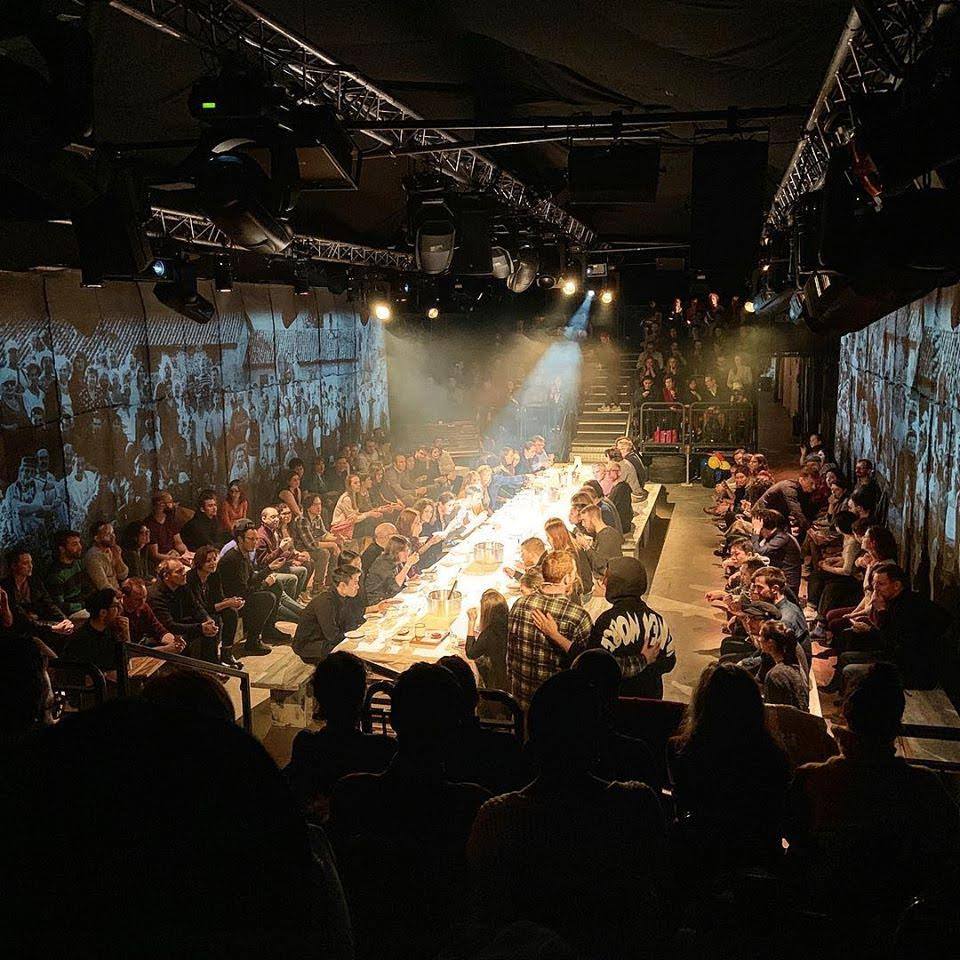Ra-zom! Performing revolution in London5 min read
In the spring of 2019, I joined the Euromaidan protests.
Actually, I attended an immersive and participatory play about the protests in London, England, where audience members were encouraged to perform revolution alongside the actors. Counting Sheep was an intense experience, but one which got me thinking less about Ukraine and more about the power and pleasure of communal gathering.
About the protests
In late 2013, Ukrainian President Viktor Yanukovych turned down a deal from the European Union in favour of an offer from Russia. Thousands, and then tens of thousands of protestors gathered at Maidan Nezalezhnosti, or Independence Square, in Kiev. They carried with them a vision of a westward-leaning Ukraine, one with deeper ties to Europe, European values, and European markets, and they were outraged by Yanukovych’s pivot to the East.
The protests lasted for months and culminated in clashes between protestors and the police that killed over 100 people. Yanukovych fled to Russia, and the subsequent election led to the ascension of anti-Russian Petro Poroshenko as President of Ukraine.
About the sensation
In its current iteration – there have been several – Counting Sheep bills itself as a ‘theatrical sensation’ about the Euromaidan protests. The purpose of the show, according to co-creator and performer Mark Marczyk, “is to share our experience of protest, revolution and war and to tell the story of how we found love and life and hope in that experience.
“We tried to reimagine that experience in a way that allows multiple access points for audience members and leaves them with the choice of whether they want to participate or not. In that way the play is like a mirror that shows you who you are and what you value.”

Image credit: Michael Rubenfeld
Michael Rubenfeld, executive artistic producer, explained that “The Maidan Revolution in Ukraine was one of he most incredible contemporary acts of human resilience and a country’s decision to take agency over its future.”
He added, “I was deeply inspired by the Revolution of Dignity and believe that Ukraine has something to teach the world.”
You see, we want a revolution
I took my seat on a bench next to a pile of sandbags. We began with a picnic. Protestors (audience members who had paid a little bit extra) and premium protestors (who had paid even more) were given buterbrod and borscht and vodka. A fiddler started playing. We danced round the theatre.
And then the protests began. The picnic table disappeared. Sandbags! Sandbags! Help us carry sandbags. Move this here. Put this on.
The music was blasting. The actors had slipped into the crowd, now we were all actors, all acting out the revolution. Someone started chanting. We all started chanting.
Ra-zom! Ra-zom!
A couple in their twenties. A bookish-looking fifty-something. The girls from Canada who’d gotten their tickets for free.
Ra-zom!
I asked as many people I could if they knew what that word meant. No one did. No one seemed to mind. No one objected to chanting a word that could have meant anything.
The music stopped, the crowd broke up, and the lights mellowed. After the revolution, the actors explained, Russia had taken Crimea and war broke out in Eastern Ukraine. But the revolution hadn’t ended, really; it continued in their music, in their art.
The revolution continued at the theatre, and we all took part. Whether we believed in it or not.
Politics is tricky. It takes a lot of information to say you know a little. It takes a fool to say he knows a lot. Rash decisions, quick judgements, easily lead to bad choices. And yet that night, we had all raged against something or in favour of something that we knew almost nothing about. A group of middle-class British theatre-goers had transformed themselves – willingly, enthusiastically! – into angry protestors.
I asked a few people if they usually attended protests. Most of them said no. Politics is tricky.
Ra-zom!
That night, it wasn’t for the politics, it was for the crowd. What I learned more than anything is that being in a mob is fun. It is exciting. It gave us a sense of purpose and it made us feel like we belonged to something bigger than ourselves. It gave us so much of what we had been missing. It made us want to do it again. I imagined I could hear people saying: Give me a revolution, any revolution, and I will join the crowd.
The people have spoken
From the Arab Spring to Occupy Wall Street, from Euromaidan to Brexit, from climate action to the Women’s March, every voice has a body. News reports are crowded with stories of mobs assembling in city squares or marching down main streets. The people, we hear, want change.
But I wonder how many of the people in those crowds really just want to participate: to sing, to chant – any old word will do – to hold hands, to cry on someone else’s shoulder. Occupy Wall Street dissolved when the weather got bad. The Arab Spring replaced dictators with dictators and civil war. The Women’s March fractured into The Women’s March and March On, and it’s hard to say how long either will last. It seems that as often as not, street protestors don’t get what they want.
Except for those who just want to show up.
Counting Sheep premiered in Toronto, Canada as a folk opera by Mark and Marichka Marczyk, and has been rewritten for the VAULT Festival in London, England under the direction of Natalia Kaliada and Nicolai Khalezin. It runs in London until March 17th.





